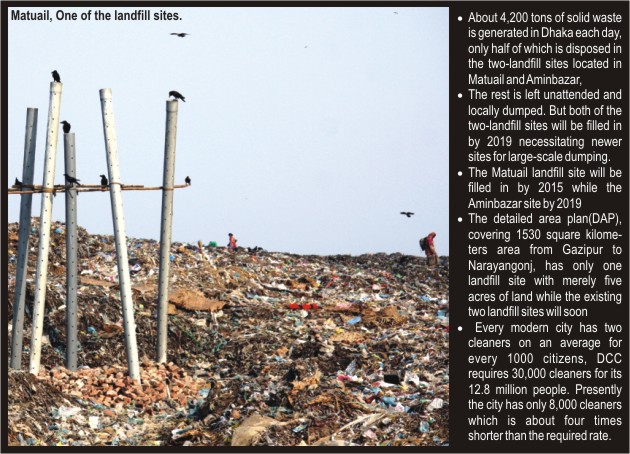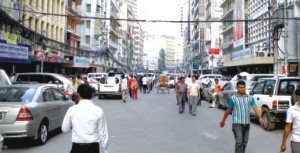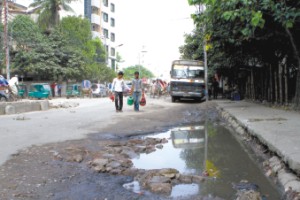Cover Story
Khoka's Legacy
The city that was once marked by its minarets, domes and abundant greenery has now grown into one of the worst metropolises in the world. With the much-awaited DCC election scheduled for December 29, the Dhaka City Corporation's failure to dispose the garbage and repair a large number of dilapidated roads and streets, and its lackadaisical attitude towards dealing with the encroachment of the footpaths and keeping the city clean are spurring debates over its accountability to the public.
Rifat Munim
Photos: zahedul i khan
 |
Streets in most of the localities are full of puddles after rain. |
Despite the pungent stench emitting from the garbage stacked along a narrow street leading to the bus stand in Mohammadpur, Nazmul Islam, a work-a-holic, took a deep breath in the fresh morning air and scurried happily to his office. Like most of the city dwellers, he had learnt to overlook the sides of the streets or footpaths, which in the residential areas assume the dumping ground for leftovers from home.
He would have been happier as he got back home if only the same street strewn with garbage had not been waterlogged after heavy downpour in the evening. As he began to fold his trousers for the inevitable wading in the water, he did not know what was lying in wait for him, in one of his most inauspicious evenings.
Since both sides of the street were occupied by rotting trash drenched in the rainwater, he had to trudge carefully into the puddles, one of which was covering a gaping hole in the middle of the narrowing street which plunged him straight into the filthy sewers making him almost choke to death.
“How would anyone know that there would be such a huge manhole inside a puddle? All I was thinking was how early I could get home. But what scares me is the fact that such broken slabs or missing metal plates over a manhole is not rare in this area,” says Nazmul.
Although he did not break his arms or legs, doctors had to treat him extensively to extract the dirt that had passed into his stomach. As many of such accidents with dire consequences followed sometimes because of muddy puddles camouflaging open manholes or other hazards along the streets locals lodged several complaints with the Ward Councillor with the standard reply: it would be repaired as soon as possible.
As the residents' plea fell on deaf ears, they took it upon themselves to repair the slab, which required considerable amount of time and money. It was still worth the trouble as further waiting for the authorities to repair it would prove to be too long and too dangerous.
“Having faced many accidents because of the broken slab, we sent several notices to the Ward Councillor on behalf of the local people. Although the Councillor promised, the replacement of a slab never materialised, making us wait to see more accidents take place,” says Abdul Hannan Bhuiyan, Nazmul's neighbour.
Such self-motivated initiatives on the part of the locals appear to be the only alternative for resolving many emergencies in different parts of the city, something that the DCC is solely responsible for. Even basic services such as garbage collection and drainage management are grossly neglected leaving many parts of the city in a putrid state. Virtually all localities of the city are reeling under mounting problems making it on one hand the second least liveable city in the world, and exposing people to burgeoning health hazards on the other.
 |
Sadeque Hossain Khoka |
DCC, the nearly one hundred and fifty year-old organisation, is responsible for ensuring basic rights to the city dwellers, be they rich or poor, male or female, Muslim or Hindu, young or old. But in reality the situation is quite the opposite, it has recently spurred many debates concerning growing irregularities and corruption in its management and administration.
As the highest tier of the local government, the DCC is accountable for monitoring over a whole gamut of activities including waste management, repair of dilapidated roads and streets and buildings, issuing trade licenses, control of adulterated food, advertisement rules and erection of billboards, on-road car parking, urban planning and transport. With the DCC election drawing nearer, it is indeed apt to speculate on the body's stark failures, and achievements, if there are any, of the city governing body, and the legacy of the city Mayor who finished his stipulated tenure on May 14, 2007 and is still incumbent till the up and coming election which, as per an Election Commission announcement made recently, will be held in December 29.
Dhaka was once marked by its dome-shaped minarets and famed for its muslin trade. Now that the city comes a long and weary way with many organisations celebrating its 400 years as a capital, it has come to represent an agglomeration of urban construction carried on with no particular order. More alarming is the ever-growing corruption of a section of DCC officials who allegedly are involved with various unscrupulous activities worsening the suffering of the mass people.
Fakhrul Amin, who has been living at Senpara Parbata in Mirpur 10 since last year, under DCC Zone 7, reveals that the street in front of the multi-storied Rupayan building has been a perennial source of suffering because of its decrepit condition. Several instances of tender manipulation, he believes, have caused the dillydallying while the work of repair is yet to be implemented.
 |
Nagar Bhaban |
“Ever since I shifted here, I saw people dig the street with shovels. Only God knows why they have to dig the same road time and again, and the digging takes place mostly during the rains and makes parts of the street a small canal.” He says. “Then we come to know that it is going to be repaired. Unfortunately, the repair is yet to materialise.”
Instances of tender manipulation in all the tiers of the local government are quite rife all over the country. Local political goons especially those affiliated with the high-ups in power get involved with a section of the DCC engineers and try to get all the tenders in a certain locality, ousting thereby experienced or dedicated contractors. It also explains why repair of a street takes so long.
When contacted, Dr Abdur Razzaque, executive engineer of DCC Zone 7, says that he was not aware of any incident of tender manipulation. Asked about the dillydallying of repairing the rundown street, he says, “The recent digging was done by another government agency to fix a sewer problem. Then it took us some time to repair the places that had been dug,” explains Razzaque.
Another engineer of the same zone says on conditions of anonymity that repairing all the roads of a Ward requires at least ten crore taka whereas they are allocated only around one or two crore taka for the purpose. This deficit makes them focus only on one out of ten or more roads.
The present Mayor Sadeque Hossain Khoka, who has served a long eight unimpressive years, refers to the DCC budget for the fiscal year 2010-11 and says, “From the national budget, the government allocates only a little for the DCC, it has promised to provide an additional development fund of one hundred crore taka though. But the city of more than ten million people requires at least 10,000 thousand crore taka for its development. Yet the amount for repairing streets has been increased from 225 crore to 279 crore taka this year. I think it will enable DCC to repair many of the dilapidated streets and roads.” As for the corruption of the DCC officials, he says, “We try our best to curb all malpractices involved with the implementation of the street repairing projects. Yet there may be some isolated instances of corruption, which it is not possible for us to look after.”
The DCC budget proposal for the fiscal year 2010-11 amounts to 704 crore and 34 lakh taka. Half of this amount will be spent over the management of the DCC officials and zonal offices, which include salary and perks of the officials.
 |
 |
Some Mohammadpur residents repair the slab of a big manhole. |
Pedestrians and school students walk along the dry part of the street while the other side has become a breeding ground of mosquitoes. |
While the claim of budget deficit is common among the DCC officials, there are allegations against the city governing body that a lot of money is provided for many unimportant sectors while highly important ones suffer from a budget deficit. The city beautification is one such sector, which sees the expenditure of more than one crore taka every year for the construction of water fountains, sculptures and gardens in different parts of the city. Such beautification project raises questions since emergency services like maintaining a good drainage system, waste management and the much-desired city-cleaning project are left in a sorry state in most of the Wards.
 |
Leftovers from home occupy many of the city's footpaths. |
Khoka, in his Mayoral address at the presentation of the budget for the current year, highlighted the issues of waste management and city cleaning project to make Dhaka one of the most beautiful cities of Asia. Ironically, a visit to some of the city parks including the Baldha Garden at Wari, Mohammadpur Iqbal Road Park and Kalabagan Lake Circus Park, reveals how gross lack of management and monitoring have made those places unfit for recreational activities, revealing severe mismanagement and apathy of the waste management department. The same is also true of the laxity of measures against on-road car parking especially in the busiest commercial hub of the city.
According to Dr Tariq Bin Yousuf, project director of the waste management department, about 4,200 tons of solid waste is generated in Dhaka each day, only half of which is disposed in the two-landfill sites located in Matuail and Aminbazar, and the rest is left unattended and locally dumped. But both of the two-landfill sites will be filled in by 2019 necessitating newer sites for large-scale dumping.
“We are now in the middle of a ten-year master plan. Although we have received 35 environment friendly trash compactors and 20 arm-roll carriers, we should not be very optimistic about the scenario. There are lots of challenges to face in future,” he says. “Keeping these in mind, we are revising our master plan. But it is really disappointing to see that the detailed area plan (DAP) with an area of 1530 square kilometre area envisions only one landfill site of five acres in Savar.”
“At the same time, people's mindset should be changed and their sense of responsibility should be enhanced,” he adds.
Asked about diverting more funds to this sector, Khoka says, “Every modern city has two cleaners on an average for every 1000 citizens whereas we have only 8,000 cleaners for a population of one crore and 50 lakh people. In order to resolve the manpower problem, we sought help from the establishment, and Housing and Public Works ministries, but we have not got the clearance. So what is the point of allocating more money to the sector?”
 |
The eco-friendly trash compactors have hit the city streets to reduce pollution and carbon emission. |
When his attention was drawn to the situation in the last tenure of the BNP government, he briefly says, “It is very difficult to procure any money from the government, be it a BNP or AL one.”
Another highly corrupt sector of the DCC is the tax department that supervises issues related to trade license. While it is illegal to set up a trading office in a residential area, numerous trading offices are found in residential areas.
“The law regarding this should be clarified at first. Trading offices are not allowed in the government designated residential areas like Dhanmondi, Gulshan and Banani. Be that as it may, it is our responsibility to approve or disapprove of a trade license based on a set of rules and regulations. But monitoring over it is the responsibility of Rajuk and others,” says Md Saidur Raahman Khan, chief tax officer of the DCC.
Saidur points to a long-standing problem: the overlapping of responsibilities among several government agencies. The DCC shares many of its responsibilities with agencies such as Capital City Development Authority, Dhaka Metropolitan Police, the Bangladesh Telephone and Telegraph Board, Bangladesh Road Transport Corporation and the Dhaka Water and Sewerage Authority. This overlapping for the most part has resulted in providing an unclear vision about the actual responsibility of each agency.

Despite all the explanations given by the city Mayor and the DCC officials, it is obvious that before the next DCC election, the present Mayor and his associates are leaving behind a city that has further deteriorated in terms of liveability over the past years. Strong coordination among the government agencies should also be strengthened to ensure effective governance. But more than anything, the managing and administrative bodies of the DCC, as many of DCC officials opine, should be cleansed of corruption and rampant politicisation in order to ensure accountability of the city governing body to its denizens.
 Cars parked on both sides of the road in Motijheel.
Cars parked on both sides of the road in Motijheel. |
 |
| |
A common scene in a Dhaka street. |
Meanwhile, along with Nazmul, Dhaka's 12.8 million residents are patiently waiting for a city where they can breathe freely and take a simple walk down a street without falling into a death trap.
opyright
(R) thedailystar.net 2010 |
